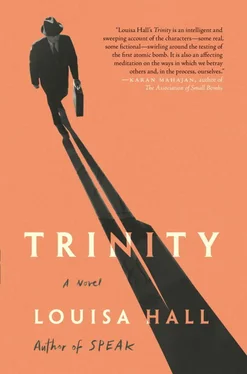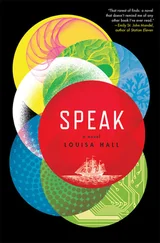He said that, though it wasn’t a relationship, he felt he owed her a clear explanation.
Then I asked him why he suddenly felt he owed her a clear explanation. I’m not sure how he answered. Then I asked him again whether in fact he’d really ended the relationship.
Yes, he told me, with the full force of conviction: he’d ended the relationship.
But by then, though I’d have liked to believe him over her, it was impossible for me to dismiss what she’d said. Perhaps it was because I’d heard her story first. Or because my husband had already admitted that he’d lied to me for some time. Regardless, it was impossible for me to fully believe him when he said that he’d ended the relationship, and therefore it was impossible for me to believe anything else that he said throughout that long and entirely useless first conversation.
LATER, WHEN I WENT INTO THE BEDROOM TO SLEEP, AND MY HUSBANDwas outside on the couch, I began to reflect in the darkness.
I reminded myself that, freely and from the start, he’d admitted that he’d slept with her. With my unsure tone of voice and that odd slippery laughter, I’d basically encouraged him to keep me in the dark, but he’d felt compelled to admit that he’d slept with her not only once, but three different times.
I thought that perhaps that admission should give me reason to accept the rest of his story.
But then I reminded myself, lying there in the darkness, that what I wasn’t taking into account in this version was the fact that experienced liars often deliver their fabrications in a coating of truth that serves to protect the softer, more vulnerable lies underneath, allowing them to get past your defenses, like the shell around the DNA of a virus, which protects it while it enters your body and begins infecting your cells, so that by the time you realize you’ve been infected, it’s already in you, and you’ve already been altered by it, and even in some ways become it.
THERE WAS ALSO THE DETAIL OF THE WOMAN’S STORY THAT I HAD TOcontend with, while I lay there in the darkness of the bedroom.
Such exquisite detail she’d given: the names they’d planned to give to their children, the jokes he’d made about their old age. She’d repeated exactly what he’d said to her, word for word, how he’d asked her to be “discreet,” how he’d said that we were “expecting a baby.”
I could imagine him saying those words. That’s the power of a story with detail. And my husband’s story, by contrast, was vague. The story he told had many holes. There were many points he didn’t recall.
He couldn’t, for instance, remember precisely how he’d ended things. He couldn’t tell me what he’d said exactly.
Her contrastingly impressive level of detail—that clipped word, “discreet,” or that strange expression, “expecting a baby,” as though we believed a baby was coming but felt that it was possible it might be something else on the way—inclined me to believe her.
But then I remembered, lying there in the dark, trying to calm myself so the baby we were expecting wouldn’t be scared by the wild way my heart was behaving, that an impressive level of detail is also a strategy employed by many experienced liars.
Many liars, I reminded myself in the dark, add extraneous detail to the stories they tell, in order to make them resemble the truth.
In fact, we rarely recollect so many detailed impressions of the conversations we have. We so often forget exactly what was said by the people we talk to. Perhaps, then, I said to myself, a certain vagueness and inability to recall all the details is the best guarantee of the truth.
In that way, all night, I continued to balance the two stories I’d been given that day: two incompatible tales that came up against each other, making it impossible for me to believe either one, or to feel any certainty about the new, altered life I’d been given, so that in the end my heart beat even faster, and I couldn’t find a way of soothing myself.
I began to worry I’d vomit again. Then I worried that all the adrenaline and the vomiting and the wild beating of my heart would damage the baby within me, which was how I persuaded myself, in the end, to go get my husband up from the couch and to bring him into the bedroom, and let him lie down behind me, and hold me, and temporarily calm me.
SEVERAL DAYS AFTER THAT, OUR SON WAS BORN.
It was a difficult time. Though, as I’ve said, I’d felt oddly placid through most of the pregnancy, those last days before his birth were not calm.
And after his birth, because he was a difficult baby, or perhaps more accurately an unhappy baby, I feared that my anxiety had affected him badly.
As soon as we’d gotten him home, I was almost immediately overwhelmed by the responsibility of caring for such a small creature, a creature I’d brought into a world that seemed only to shock and alarm him.
He cried all the time. Often, inconsolable, he cried until his throat was hoarse, and still he didn’t stop crying.
Though I did my best to soothe him, caressing him, changing his diaper, giving him my nipple to suck, he wouldn’t be soothed. He seemed to feel that something was definitively wrong, but what that something was I couldn’t place, and therefore couldn’t prevent, and the awareness of this constant failure, my inability to protect this creature I’d introduced to the world, caused me to move through my day in a state of steady decay, so that by nighttime my mind was no longer coherent.
In the time between when I put my son down in his crib and when I myself went to sleep, I wandered around the house strangely, picking up items that someone else had at some point misplaced or forgotten.
BETWEEN MY EXHAUSTION AND THE IMMEDIATE REQUIREMENTS OFraising our child, I was distracted for several months, through the winter and the short spring. I only emerged from that state when the weather was hot again and I’d gotten more of a handle on how to put our son to sleep, and how to organize the hours of his day so that he was less often unhappy.
It was June when I woke from the daze I’d slipped into and returned to the work of understanding my husband.
By then, I was still absorbed in our son, but because he and I were so often together, there was less of a requirement for me to puzzle over his nature. Our son revealed himself to me entirely. He wore his emotions openly. There was no way for me to escape them, or for him to escape me.
My husband was different. He traveled less often now—he’d made an effort to spend more time at home—but still, during the week, he spent his days in his studio or in the classroom, and he came home quite late at night, so in his absence I was free to consider him from a distance.
I saw, for instance, that though for our child’s sake we had attempted to piece back together the reality of our life, nothing was real. When he told me he loved me, for instance, it was with a heightened gravity that made me feel, again, the original slight. His words were a narrow bridge over the awful knowledge I’d acquired when I picked up that phone call, a thin fiction of security, and all I had to do was look down to see the true depths of the chaos beneath them.
And when he helped me with taking care of our child, he did so with an almost religious expression, smashing pears or changing diapers with a devotional intensity that only caused me to remember how lightly he’d once taken the requirements of his position, how easily he’d set them aside, how coolly he’d closed the book of our lives and charged headlong into another.
FOR MY PART, I WOKE EACH MORNING SICK TO MY STOMACH. I FELTnauseated enough that it was difficult for me to drag my body out of bed, and in fact I began to worry that I’d gotten pregnant again, but it was only a kind of seasickness on land, my own life having begun to feel permanently unstable.
Читать дальше












